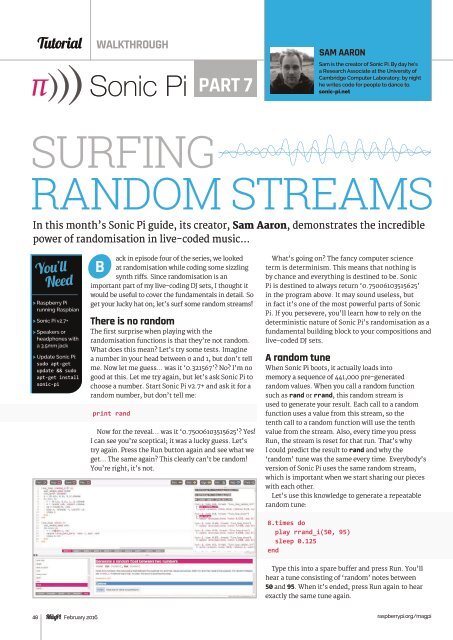Create successful ePaper yourself
Turn your PDF publications into a flip-book with our unique Google optimized e-Paper software.
Tutorial<br />
WALKTHROUGH<br />
PART 7<br />
SAM AARON<br />
Sam is the creator of Sonic Pi. By day he’s<br />
a Research Associate at the University of<br />
Cambridge Computer Laboratory; by night<br />
he writes code for people to dance to.<br />
sonic-pi.net<br />
SURFING<br />
RANDOM STREAMS<br />
In this month’s Sonic Pi guide, its creator, Sam Aaron, demonstrates the incredible<br />
power of randomisation in live-coded music…<br />
&&<br />
You’ll<br />
Need<br />
> Raspberry Pi<br />
running Raspbian<br />
> Sonic Pi v2.7+<br />
> Speakers or<br />
headphones with<br />
a 3.5mm jack<br />
> Update Sonic Pi:<br />
sudo apt-get<br />
update && sudo<br />
apt-get install<br />
sonic-pi<br />
B<br />
ack in episode four of the series, we looked<br />
at randomisation while coding some sizzling<br />
synth riffs. Since randomisation is an<br />
important part of my live-coding DJ sets, I thought it<br />
would be useful to cover the fundamentals in detail. So<br />
get your lucky hat on; let’s surf some random streams!<br />
There is no random<br />
The first surprise when playing with the<br />
randomisation functions is that they’re not random.<br />
What does this mean? Let’s try some tests. Imagine<br />
a number in your head between 0 and 1, but don’t tell<br />
me. Now let me guess... was it ‘0.321567’? No? I’m no<br />
good at this. Let me try again, but let’s ask Sonic Pi to<br />
choose a number. Start Sonic Pi v2.7+ and ask it for a<br />
random number, but don’t tell me:<br />
print rand<br />
Now for the reveal... was it ‘0.75006103515625’? Yes!<br />
I can see you’re sceptical; it was a lucky guess. Let’s<br />
try again. Press the Run button again and see what we<br />
get... The same again? This clearly can’t be random!<br />
You’re right, it’s not.<br />
What’s going on? The fancy computer science<br />
term is determinism. This means that nothing is<br />
by chance and everything is destined to be. Sonic<br />
Pi is destined to always return ‘0.75006103515625’<br />
in the program above. It may sound useless, but<br />
in fact it’s one of the most powerful parts of Sonic<br />
Pi. If you persevere, you’ll learn how to rely on the<br />
deterministic nature of Sonic Pi’s randomisation as a<br />
fundamental building block to your compositions and<br />
live-coded DJ sets.<br />
A random tune<br />
When Sonic Pi boots, it actually loads into<br />
memory a sequence of 441,000 pre-generated<br />
random values. When you call a random function<br />
such as rand or rrand, this random stream is<br />
used to generate your result. Each call to a random<br />
function uses a value from this stream, so the<br />
tenth call to a random function will use the tenth<br />
value from the stream. Also, every time you press<br />
Run, the stream is reset for that run. That’s why<br />
I could predict the result to rand and why the<br />
‘random’ tune was the same every time. Everybody’s<br />
version of Sonic Pi uses the same random stream,<br />
which is important when we start sharing our pieces<br />
with each other.<br />
Let’s use this knowledge to generate a repeatable<br />
random tune:<br />
8.times do<br />
play rrand_i(50, 95)<br />
sleep 0.125<br />
end<br />
Type this into a spare buffer and press Run. You’ll<br />
hear a tune consisting of ‘random’ notes between<br />
50 and 95. When it’s ended, press Run again to hear<br />
exactly the same tune again.<br />
48 February 2016<br />
raspberrypi.org/magpi


